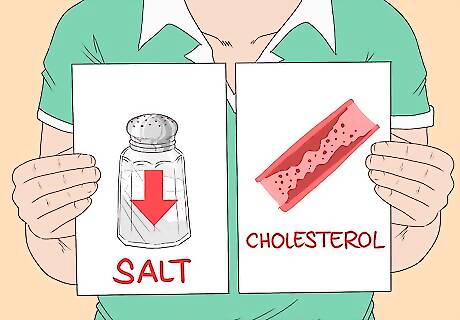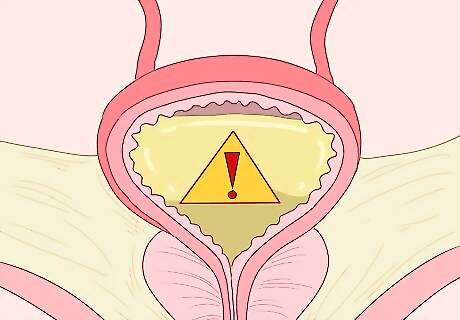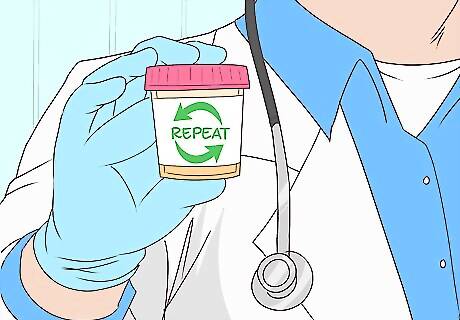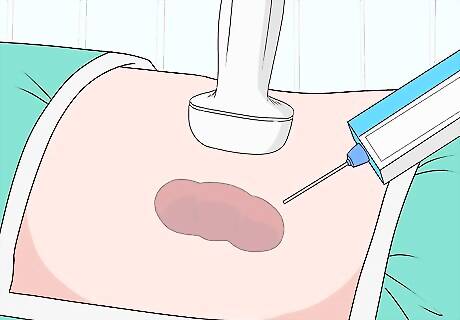
views
X
Expert Source
Robert Dhir, MDBoard Certified Urologist & Urological Surgeon
Expert Interview. 23 September 2020.
[2]
X
Research source
Trying Lifestyle and Medical Treatments

Take steps to reduce your blood pressure. Lifestyle strategies to reduce your blood pressure include: Note: Elevated blood pressure puts a lot of strain on the kidneys, and since persistent proteinuria (elevated protein in the urine) is almost always linked to a problem in the kidneys, reducing your blood pressure can help the problem significantly. Decreasing the salt in your diet. To do so, avoid excess table salt on foods prepared at home. Perhaps more importantly, avoid eating out too frequently, or consuming too many processed foods, as these are known to be high in salt (significantly more so, on average, than foods prepared at home). Cutting back on cholesterol. Cholesterol build-up contributes to plaques forming in your arteries, which in turn leads to increased blood pressure. Ask your doctor for blood tests to measure your fat and cholesterol levels to see if this is an area of your diet that could use improvement.

Opt for a blood pressure medication. Essentially everyone who is diagnosed with a level of kidney disease or kidney disfunction (which are the primary reasons for persistently elevated protein in the urine) receives a blood pressure medication from their doctor. Specifically, the ideal one for doctors to prescribe is an "ACE inhibitor" (an angiotensin-converting enzyme inhibitor). Examples include Ramipril, Captopril, and Lisinopril. The benefit of this specific class of blood pressure medication is that it has an additional benefit (and a "protective effect") for your kidneys. Ask your doctor about receiving a prescription for this medication if you are not taking it already. You may need more than one blood pressure medication in more severe cases of kidney disease.

Ask your doctor about other medical treatments. For instance, if you have an underlying autoimmune disease causing kidney problems (and hence protein in your urine), you may need medications to suppress your immune system. If your kidney troubles (and proteinuria) are complications of diabetes, you may need medications such as Metformin or Insulin to obtain better daily control of your blood sugar levels. There are many potential diagnoses that could lead to kidney trouble and resulting proteinuria, so speak with your doctor to come up with the best medical management for your specific case.
Evaluating The Cause

Diagnose the cause. It is important to understand that the only way to reduce or treat protein in your urine is by diagnosing the underlying cause. This is because protein in the urine is not a diagnosis in itself. Rather, it is a symptom indicating that something else is going on. It is only in the diagnosing and treating of that "something else" that the elevated protein level can be addressed and dealt with.

Determine which type of proteinuria (elevated protein in the urine) you are experiencing. There are three types of proteinuria, and the good news is that two of the three require no treatment and usually resolve on their own with time. The third type, however, requires a more comprehensive medical examination to determine the underlying cause. The three types are: Transient proteinuria: This is when a urine test reveals elevated protein on one reading, but the level diminishes on its own and returns to normal with subsequent readings. Transient proteinuria is normally related to acute stresses such as an illness that causes a fever or more exercise than usual (such as training for a marathon). Once the stress passes or your body adapts to it, your protein levels should also return to normal. Orthostatic proteinuria: This is when the abnormal protein levels are related to postural changes (standing versus sitting versus lying down). It is uncommon and more likely to be present in adolescents. If present, it does not require treatment and almost always resolves itself by adulthood. Persistent proteinuria: This is when the protein levels in your urine remain elevated after repeated testing. It is indicative of an underlying problem such as kidney disease, diabetes, autoimmune disease, or another medical condition. It requires a series of tests for diagnostic purposes as well as medical treatment.

Evaluate any transient stresses you may be experiencing. As previously mentioned, if you are currently ill with a fever, exercising more than usual, or suffering from other acute stressors in your life, the protein levels in your urine may be elevated transiently as a result. See your doctor again a few days after your first test for a repeat urine test, at which point they can confirm if your protein levels have diminished or returned to normal. If you are experiencing "transient proteinuria," there is nothing you need to do to treat it. Your levels will return to normal on their own within a few days to a couple of weeks. If you are experiencing an acute stressor such as fever, intense exercise, or something else, see your doctor for repeat urine tests to confirm that nothing more serious is going on.

Request repeat urine tests. It is important to obtain a series of measurements of the protein level in your urine to see how it is progressing and whether or not it is improving on its own. Your doctor may offer you a urine test to do in the washroom in their clinic, or they may ask you to take it home and to return it to the lab once you have collected the urine sample. If you store your urine at home, keep it cool in the refrigerator until you are able to deliver it to the lab for formal analysis.

Get blood tests. Additional diagnostic testing that your doctor may perform includes blood tests, particularly if they suspect that you may have underlying kidney disease or other health problems. If your doctor orders blood tests, they will likely be measuring BUN (blood urea nitrogen) and creatinine levels. Both of these are kidney function tests, providing your doctor with valuable information about the health of your kidneys. Your doctor may also order other blood tests to measure HbA1c (a diabetes indicator) or autoimmune antibodies if they suspect an underlying autoimmune disease. The tests your doctor performs depend on your medical history and the medical conditions that your doctor thinks you are most at risk of having.

Get a kidney biopsy. In some cases, a kidney biopsy is also required as a further investigation to determine the cause of the protein in your urine. This is rare, but it may be needed if your doctor cannot otherwise determine the cause.

Be aware that protein in the urine during pregnancy is another matter. If you are currently pregnant and have elevated protein levels, it may be due to a condition called preeclampsia. Read How to Deal With Preeclampsia for more information on preeclampsia and elevated protein levels in your urine during pregnancy.




















Comments
0 comment